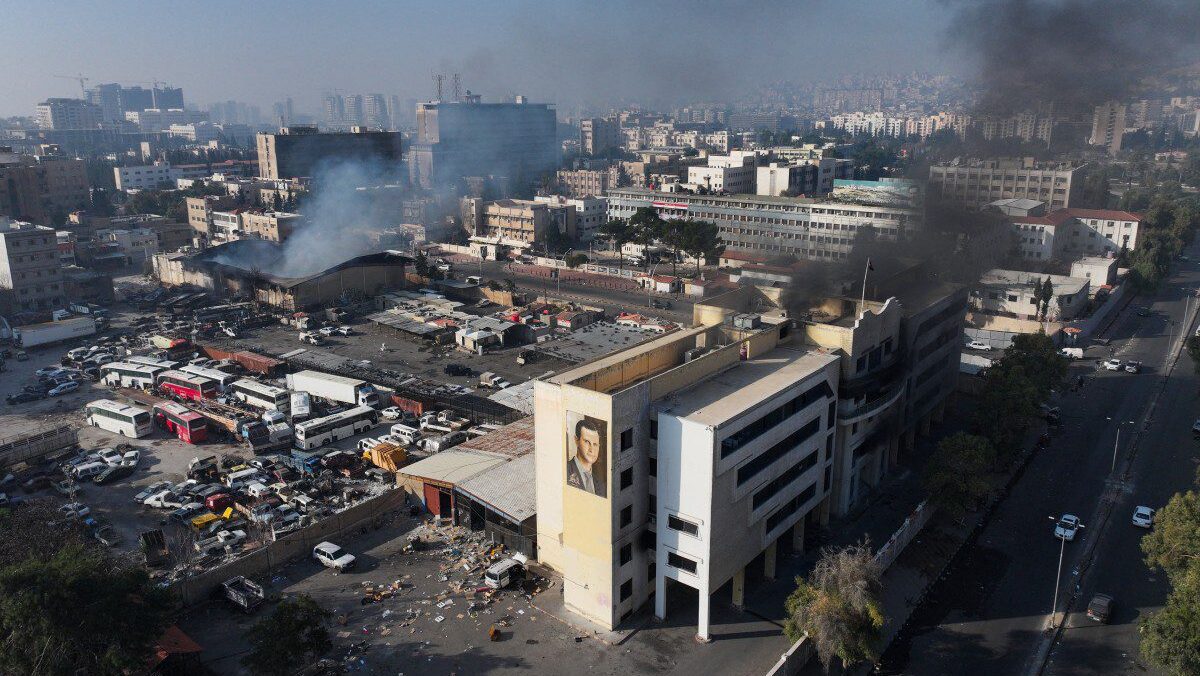
Photo: OMAR HAJ KADOUR / AFP
The tyrannical reign of Syrian President Bashar Al-Assad came to an end on Sunday morning following a bloody 13-year civil war during which time he has been held responsible for hundreds of thousands of deaths.
Western leaders and media organisations have celebrated Syria coming out of the frying pan, while questions over what comes next—now that a proscribed jihadist group is taking control—appear to be emerging as an afterthought.
European Commission Vice President Kaja Kallas described the end of Assad’s dictatorship as “a positive and long-awaited development,” adding that it “shows the weakness of Assad’s backers, Russia and Iran,” which had withdrawn their support for his regime.
European Council President António Costa also hailed “a new opportunity for freedom and peace for all the Syrian people.
The movement behind Assad’s toppling was led by Hayat Tahrir al-Sham (HTS), a jihadist group previously allied with Islamic State and Al Qaeda.
It claims to have shed these links, and has assured the U.S. that—as The New York Times put it—there is “no intention” of allowing the Islamic State to be part of their movement. But HTS remains proscribed as a terror group by the U.S., United Nations and UK—the latter of which is reportedly considering its position.
British journalist Peter Hitchens described Western media celebrating recent events as tying themselves in “terrible knots, as they all continue to believe it would be good to overthrow Assad, but it’s impossible to pretend that the ‘rebels’ are not Jihadist ultras, who we’d arrest if they turned up in our own countries.”
America’s own transition of power makes it difficult to foreshadow Washington’s actions over the coming months.
Outgoing U.S. President Joe Biden accepted that “some of the rebel groups that took down Assad have their own grim record of terrorism and human rights abuses.”
We’ve taken note of statements by the leaders of these rebel groups in recent days and they’re saying the right things now. But as they take on greater responsibility, we will assess not just their words but their actions.
Biden also authorised American airstrikes against Islamic State camps and operatives inside Syria on Sunday, as U.S. Central Command head Michael E. Kurilla stressed that “we will not allow ISIS to reconstitute and take advantage of the current situation in Syria.”
But Donald Trump, who will become Commander in Chief on January 20th, responded to events by saying that “Syria is a mess, but is not our friend.”
THE UNITED STATES SHOULD HAVE NOTHING TO DO WITH IT. THIS IS NOT OUR FIGHT. LET IT PLAY OUT. DO NOT GET INVOLVED!
Vice President-Elect J.D. Vance later echoed Trump’s sentiment in a post on Twitter/X.
As President Trump said, this is not our fight and we should stay out of it.
— JD Vance (@JDVance) December 8, 2024
Aside from that, opinions like the below make me nervous. The last time this guy was celebrating events in Syria we saw the mass slaughter of Christians and a refugee crisis that destabilized Europe. https://t.co/rUsbudKtZP
Israel, which borders Syria, also carried out airstrikes over the weekend, targeting military assets which it fears could fall into the hands of Islamist rebel forces and used against its people. Meanwhile, ground forces sent by Benjamin Netanyahu made their first entry into Syrian territory since the 1973 October War, taking control of the mountain summit of Mount Hermon.
Israeli minister Amichai Chikli warned that “the events in Syria are far from being a cause for celebration,” adding:
Operatively, Israel must renew its control at the height of the Hermon and establish a new line of defense based on the 1974 ceasefire line. We must not allow jihadists to establish themselves near our settlements.
הארועים בסוריה רחוקים מלהיות סיבה למסיבה. למרות הריברנדינג של הייאת תחריר א-שאם ומנהיגה אחמד א שרע, בשורה התחתונה מרבית סוריה נמצאת כעת בשליטת ארגוני בת של אל- קאעידה ודעאש.
— עמיחי שיקלי – Amichai Chikli (@AmichaiChikli) December 8, 2024
החדשות הטובות הן התחזקות הכורדים והרחבת שליטתם בצפון מזרח המדינה (מרחב דיר א-זור).
אופרטיבית על ישראל… pic.twitter.com/AJG3fhFrji
Members of Syria’s Christian community also greatly fear that the country’s jihadist takeover will leave them under new and extreme threat, with one activist telling The European Conservative, “I believe evacuation and humanitarian aid [of Christians in Syria] should be the priority at this point.”
The ousted leader is now in Moscow with his family, after Russia granted him asylum, citing “humanitarian reasons.”
Officials are now beginning to question whether it will be possible to bring the former President and his sidemen to justice for their atrocities. Foreign Policy argues that possible “prosecutions are important not only as a measure of respect for the victims and an acknowledgment of their plight. They are also a critical tool for the future.
Establishing a precedent of accountability for the atrocities of the past would be a significant way for the international community to signal expectations for the future.
